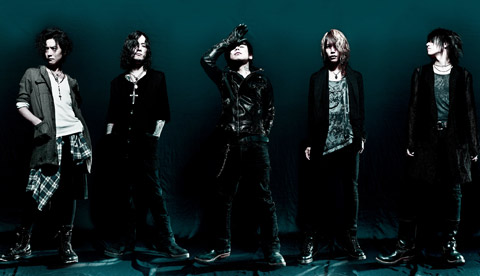
LIGHT FROM THE NETHERWORD “If there were a lot of bands like Dir En Grey around Japan, it would probably be a pretty messed up country,” says guitarist Die (right). |
Back in March, the Japanese band Dir En Grey had recorded about half of what became Dum Spiro Spero, their eighth album. Then the world ended, or at least came pretty close.An 8.9-magnitude earthquake and its subsequent tsunami killed thousands, annihilated entire towns, and crippled Japan's infrastructure. Dir En Grey — and apparently many other Japanese citizens — still don't know how worried they should be about radiation lingering from nuclear power plant calamities caused by the earthquake. They do know they're none-too-pleased about their government's possible attempts to downplay the danger.
At the time, Dir En Grey were in Tokyo, away from the worst of the carnage. But in the wake of biblical levels of agony, Japan's masters of wondrously evil art-metal second guessed whether finishing a rock album was the most socially responsible priority. (On Tuesday, they'll join the equally strange and dazzling Birthday Massacre at the Paradise.)
"There were serious concerns about power outages," explains guitarist Die, bearer of the raddest rock-and-roll stage name on the planet, through a translator and Skype. "People were being asked to cut down on the amount of electricity they used. Making an album didn't seem to be right thing to be doing. But in the end, we knew we have fans in the areas that were most seriously affected. One thing we were able to do to, perhaps, was give those people a bit of hope and finish the album."
The trade-off in the use of electricity to finish Dum Spiro Spera was an intangible — hope — that we can assume people are able to extract from a dark-as-fuck netherworld of melodious death metal. It was released stateside in August off Brooklyn-based the End Records.
While the elaborate, meditative quiet sections switch off with passages of cerebellum-trouncing heaviness, vocalist Kyo produces falsetto coos, piercing screeches, and gravel-spitting snarls, as has been his wont since he and the other current members of his band joined forces in 1997. Dir En Grey are all over the place, which tempts me to pontificate on what I presume is the delicious over-the-top tendencies of Japanese popular culture . . . except all I know about Japanese pop culture is anime, manga, and a few metal bands, and these things do not encompass the entirety of Japanese pop culture.
"If there were a lot of bands like Dir En Grey around Japan, it would probably be a pretty messed up country," says Die. "In Japan — and it's probably the same in the States — the bands making the most popular music are concerned with how to sell more CDs and how to get to the top of the charts, rather than music itself. The results are something quite empty. That's the opposite of what we've been doing."
Maybe that sounds a little self-congratulatory, but if Die means his band doesn't cater to the frothing masses, he's not wrong. They're certainly not catering to English-language speakers. Let's say they're catering to appreciators of unabashedly unusual and unquestionably brutal metal. . . . Then again, perhaps the linguistically unaffected appeal of Dir En Grey isn't about labels.